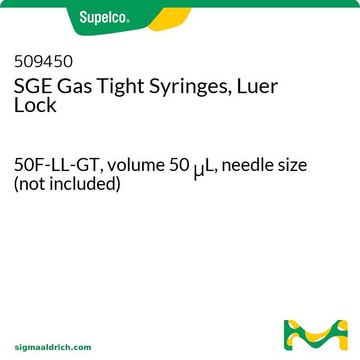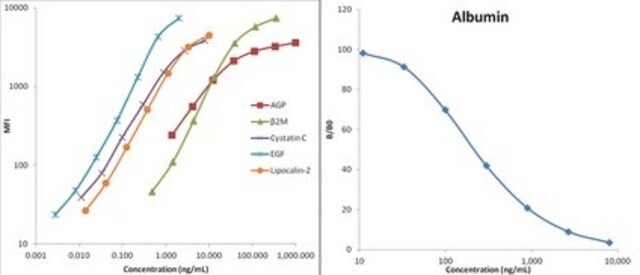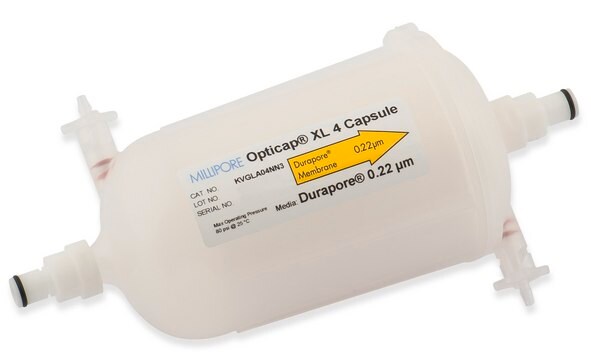RKTX1MAG-37K
MILLIPLEX® Rat Kidney Toxicity Magnetic Bead Panel 1 - Toxicity Multiplex Assay
The analytes available for this multiplex kit are: Clusterin, GSTα, IP-10, KIM-1, OPN - Osteopontin, TIMP-1, VEGF.
About This Item
Recommended Products
Quality Level
species reactivity
rat
manufacturer/tradename
Milliplex®
assay range
accuracy: 70-123%
standard curve range: 0.03-20 ng/mL
(IP-10, KIM-1, OPN)
standard curve range: 0.03-20 ng/mL
(VEGF)
standard curve range: 0.27-200 ng/mL
(TIMP-1)
standard curve range: 2.06-1500 ng/mL
(Clusterin)
standard curve range: 4.12-3000 ng/mL
(GSTα)
inter-assay cv: <10%
intra-assay cv: <15%
(All other analytes)
inter-assay cv: <20%
intra-assay cv: <30%
(GSTα)
technique(s)
multiplexing: suitable
detection method
fluorometric (Luminex xMAP)
shipped in
wet ice
General description
Panel Type: Toxicity
Application
- Analytes: Clusterin GSTα IP-10 KIM-1 OPN - Osteopontin TIMP-1 VEGF
- Recommended Sample type: urine
- Recommended Sample dilution: 1:2
- Assay Run Time: Overnight
Features and Benefits
Other Notes
Legal Information
Signal Word
Danger
Hazard Statements
Precautionary Statements
Hazard Classifications
Acute Tox. 3 Dermal - Acute Tox. 4 Inhalation - Acute Tox. 4 Oral - Aquatic Chronic 2 - Eye Irrit. 2 - Skin Irrit. 2 - Skin Sens. 1 - STOT SE 3
Target Organs
Respiratory system
Storage Class Code
6.1C - Combustible acute toxic Cat.3 / toxic compounds or compounds which causing chronic effects
Certificates of Analysis (COA)
Search for Certificates of Analysis (COA) by entering the products Lot/Batch Number. Lot and Batch Numbers can be found on a product’s label following the words ‘Lot’ or ‘Batch’.
Already Own This Product?
Find documentation for the products that you have recently purchased in the Document Library.
Related Content
Multiplex toxicity assays enable researchers to simultaneously measure multiple toxicity biomarkers of various organs to gain a better understanding of toxicity. Explore how MILLIPLEX® multiplex toxicity assays are advancing research on liver injury, kidney toxicity, genotoxicity, and more.
Learn the benefits of using biomarker detection multiplex immunoassays for laboratory, companion, and agricultural animal research and explore MILLIPLEX® multiplex assays for veterinary medicine and animal health research.
Our team of scientists has experience in all areas of research including Life Science, Material Science, Chemical Synthesis, Chromatography, Analytical and many others.
Contact Technical Service






